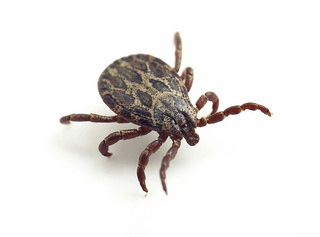Look Out! Ticks Are Already Active!
By Chris Williams on April 21, 2015.

Sorry, but there is no safe window. By April, ticks are out and about, looking for a blood meal. The black-legged ticks (previously known as deer ticks) that cause Lyme disease are our primary concern, but they are not the only ticks that transmit diseases here in the Northeast.
Most of our problem ticks are three-host ticks meaning that during each of the three stages of their life cycle they will attach to, and feed on, three different types of animals. As the tick increases in size with each stage, it feeds on a larger host animal.
Immature Ticks Can Still Transmit Diseases
In early spring, all stages of ticks that have spent the winter become active again. The smallest larval black-legged ticks (about the size of a period at the end of a sentence) are feeding on mice and other small rodents. The nymphal stage (smaller than a pin head) is also active, feeding primarily on larger rodents but it will also attach and feed on dogs and people. It is this nymphal stage that transmits most of the cases of Lyme disease because it is harder to see than the adult tick, and it is capable of feeding on people.
According to the New Hampshire Department of Health and Human Services, Division of Public Health Services, most cases of Lyme disease in the state occur between May and August when the nymphal stage of the black-legged tick is most active. Nymphal feeding activity begins in April, peaks in June or July, and by fall the nymphs have molted into adult ticks.
If You See Deer on Your Property, You Have Ticks
The adult black-legged tick feeds on deer (and horses and people when convenient). If your home is on a wooded lot with deer passing through, or you visit a place with a high deer population, you are at higher risk of contacting ticks. Rodent hosts are important for the earlier tick stages to feed on, but deer are required to complete the life cycle.
Insect repellent is not enough to protect your family from ticks and Lyme disease. Repellent, proper clothing, and tick checks are important, but so is managing your property to make it less attractive to the deer and rodents that serve as hosts for the ticks. For tips on how to keep your family and pets safe from ticks, give Colonial Pest a call, and check out the following information: